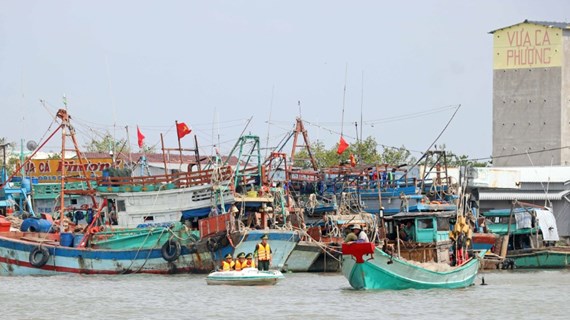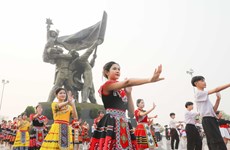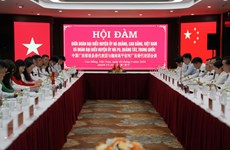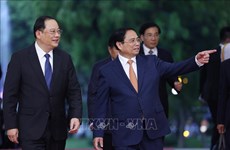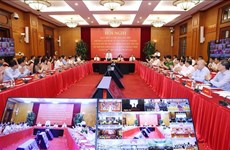East Sea conference wraps up
The sixth International Conference on East Sea with in-depth
discussions seeking experts’ ideas for the East Sea issue concluded in
the central city of Da Nang on November 18.
The sixth International Conference on East Sea with in-depth
discussions seeking experts’ ideas for the East Sea issue concluded in
the central city of Da Nang on November 18.
Themed “East Sea: Cooperation for Regional Security and Development,” the event saw nearly 40 speeches and garnered 80 opinions from academics and specialists from Vietnam, Southeast Asian countries, the US, China, Taiwan (China), the Republic of Korea, Australia, India, the UK, France, Italy and Belgium.
Participants raised a concern that the East Sea is becoming a strategic competitive space for world powers.
However, some held that the complicated situation in the East Sea would be a chance for ASEAN and its partners to boost their positive role in seeking solutions to the issue.
Many expressed their interest in Indonesian President J. Widodo’s initiative on a “maritime axis” that is expected to see Indonesia’s greater contribution to fostering cooperation at the sea.
Participants agreed that regional organisations, including the European Union, should share their experience on the prevention and management over territorial and maritime disputes in the region.
They also gave much space to clarify legal regulations applied to the 200-nautical-mile exclusive economic zone and the continental shelf as well as the rights of coastal states over the areas.
They underscored that all parties should refrain from conducting any unilateral actions that could change the status quo in the East Sea. They stressed the need to strictly abide by regional agreements, including the Declaration on the Conduct of Parties in the East Sea (DOC).
Participants also pointed to the need to encourage cooperation and speed up the building of a regional legal framework based on international law, which would help maintain peace, stability, maritime and aviation security, safety and freedom.
They proposed that a code of conduct should be built to ensure the implementation of international law in the East Sea, while specific recommendations should be made to clarify Article 5 of the DOC.
Common rules applied for all armed forces and law enforcement authorities at sea should also be specified, while a cooperation mechanism for non-traditional security issues should be set up, they suggested.
They also highlighted the importance of making the best use of information sharing channels, as well as promoting partnership in managing maritime natural resources and protecting and preserving the maritime environment.
During the two-day event, experts and academics also analysed factors affecting the East Sea issue and measures to build trust as well as preventive diplomacy.
Concluding the conference, Ambassador Dang Dinh Quy, President of the Vietnam Academy of Diplomacy proposed the participants continue researching on the issues to help all parties concerned clearly understand their legal obligations in the maintenance of the status quo in the East Sea.-VNA
Themed “East Sea: Cooperation for Regional Security and Development,” the event saw nearly 40 speeches and garnered 80 opinions from academics and specialists from Vietnam, Southeast Asian countries, the US, China, Taiwan (China), the Republic of Korea, Australia, India, the UK, France, Italy and Belgium.
Participants raised a concern that the East Sea is becoming a strategic competitive space for world powers.
However, some held that the complicated situation in the East Sea would be a chance for ASEAN and its partners to boost their positive role in seeking solutions to the issue.
Many expressed their interest in Indonesian President J. Widodo’s initiative on a “maritime axis” that is expected to see Indonesia’s greater contribution to fostering cooperation at the sea.
Participants agreed that regional organisations, including the European Union, should share their experience on the prevention and management over territorial and maritime disputes in the region.
They also gave much space to clarify legal regulations applied to the 200-nautical-mile exclusive economic zone and the continental shelf as well as the rights of coastal states over the areas.
They underscored that all parties should refrain from conducting any unilateral actions that could change the status quo in the East Sea. They stressed the need to strictly abide by regional agreements, including the Declaration on the Conduct of Parties in the East Sea (DOC).
Participants also pointed to the need to encourage cooperation and speed up the building of a regional legal framework based on international law, which would help maintain peace, stability, maritime and aviation security, safety and freedom.
They proposed that a code of conduct should be built to ensure the implementation of international law in the East Sea, while specific recommendations should be made to clarify Article 5 of the DOC.
Common rules applied for all armed forces and law enforcement authorities at sea should also be specified, while a cooperation mechanism for non-traditional security issues should be set up, they suggested.
They also highlighted the importance of making the best use of information sharing channels, as well as promoting partnership in managing maritime natural resources and protecting and preserving the maritime environment.
During the two-day event, experts and academics also analysed factors affecting the East Sea issue and measures to build trust as well as preventive diplomacy.
Concluding the conference, Ambassador Dang Dinh Quy, President of the Vietnam Academy of Diplomacy proposed the participants continue researching on the issues to help all parties concerned clearly understand their legal obligations in the maintenance of the status quo in the East Sea.-VNA





